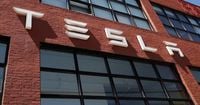Tesla is ramping up efforts to bring its long-awaited electric Semi truck to mass production, reportedly hiring over 1,000 new workers at its Gigafactory in Sparks, Nevada. According to individuals familiar with the matter that spoke with Business Insider, Tesla began onboarding the new hires in recent months, providing them with factory tours and training as the company transitions from prototype development to scaled production.
Until this hiring surge, fewer than 100 workers had been dedicated to the Semi program, many of whom were based at the pilot line in California. The hiring push coincides with the construction of a new factory at the Nevada Gigafactory, designed exclusively for Semi truck production. On Monday, April 28, 2025, Tesla released a video update confirming the facility is now structurally complete and that production equipment is being installed.
The company reiterated its goal to begin initial truck production by the end of 2025 and ramp up to full-scale manufacturing in 2026. Tesla's website currently lists over 80 open roles related to the Semi program, covering a wide range of manufacturing, engineering, and quality assurance positions. These roles are essential to supporting the complex production process for the Semi, which features a massive battery pack made up of tens of thousands of individual cells.
Originally announced in 2017, the Tesla Semi was first expected to enter production in 2019. However, battery supply constraints and broader logistical challenges pushed the timeline back multiple times. The first delivery occurred in December 2022, when PepsiCo received several units, adding more in the months that followed. Other major companies, including Walmart, Sysco, and Costco, have also taken delivery of Tesla Semi trucks.
The hiring initiative reflects Tesla's commitment to increasing its manufacturing capacity and meeting the growing demand for electric vehicles. As the automotive industry shifts towards sustainability, Tesla aims to solidify its position as a leader in electric trucking.
Industry analysts have noted that the ramp-up in production is crucial for Tesla, especially as competition in the electric vehicle market intensifies. Rivals are also investing heavily in electric trucks, making it imperative for Tesla to stay ahead. With the Semi, Tesla is not just targeting traditional freight companies but also looking to revolutionize logistics with its innovative technology.
"The Tesla Semi is designed to be a game-changer in the transportation industry, offering significant cost savings and environmental benefits," said a source familiar with the project. The truck's advanced technology includes features like enhanced safety systems and reduced energy consumption, which could lead to lower operational costs for businesses that adopt it.
As Tesla moves forward with production, it faces challenges typical of scaling up manufacturing, particularly in ensuring quality control and meeting delivery timelines. The company has struggled with supply chain issues in the past, which have affected its ability to deliver vehicles on schedule.
Despite these hurdles, the enthusiasm surrounding the Semi remains high. Companies that have received their trucks are reporting positive experiences, with many praising the vehicle's performance and efficiency. PepsiCo, which has taken several deliveries, expressed confidence in the Semi's potential to transform its logistics operations.
Looking ahead, Tesla's ambitious plans for the Semi truck could redefine the freight industry, particularly as more companies seek sustainable transportation solutions. The combination of Tesla's innovative technology and the growing demand for electric vehicles positions the Semi as a pivotal player in the future of transportation.
As Tesla continues to hire and build out its facilities, the eyes of the industry will be on its progress. The upcoming years will be crucial as the company aims to deliver on its promises and solidify its role as a leader in the electric vehicle market.




